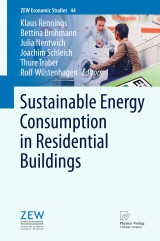Details

Sustainable Energy Consumption in Residential Buildings
ZEW Economic Studies, Band 44
|
96,29 € |
|
| Verlag: | Physica-Verlag |
| Format: | |
| Veröffentl.: | 30.07.2012 |
| ISBN/EAN: | 9783790828498 |
| Sprache: | englisch |
| Anzahl Seiten: | 263 |
Dieses eBook enthält ein Wasserzeichen.
Beschreibungen
As the residential buildings sector accounts for around 30 percent of the final energy demand in Germany, this sector is increasingly becoming the focus of public attention with regard to climate change. In this book, decisions on energy consumption by private households are examined. The analyses are based on several empirical methods. The results show that the road to more sustainable energy consumption in residential buildings is not hampered by a lack of will on behalf of the consumers. However one should be realistic that there are many instances where improving thermal institution involves additional economic costs for individual households.
<p>Introduction and Theoretical Framework.- Analysis of Existing Data: Determinants for the Adoption of Energy-Efficient Household Appliances in Germany.- Results of the SECO@Home Household Survey and Discrete Choice Analysis.- Firm Strategies and Political Instruments.- Impacts of the Instruments.- Home Heating, Technology and Gender: A Qualitative Analysis.</p>
As the residential buildings sector accounts for around 30 percent of the final energy demand in Germany, this sector is increasingly becoming the focus of public attention with regard to climate change. In this book, decisions on energy consumption by private households are examined. The analyses are based on several empirical methods. The results show that the road to more sustainable energy consumption in residential buildings is not hampered by a lack of will on behalf of the consumers. However one should be realistic that there are many instances where improving thermal institution involves additional economic costs for individual households.
Includes supplementary material: sn.pub/extras
Diese Produkte könnten Sie auch interessieren:

A Sea Change: The Exclusive Economic Zone and Governance Institutions for Living Marine Resources

von: Syma A. Ebbin, Alf H. Hoel, Are Sydnes

96,29 €















